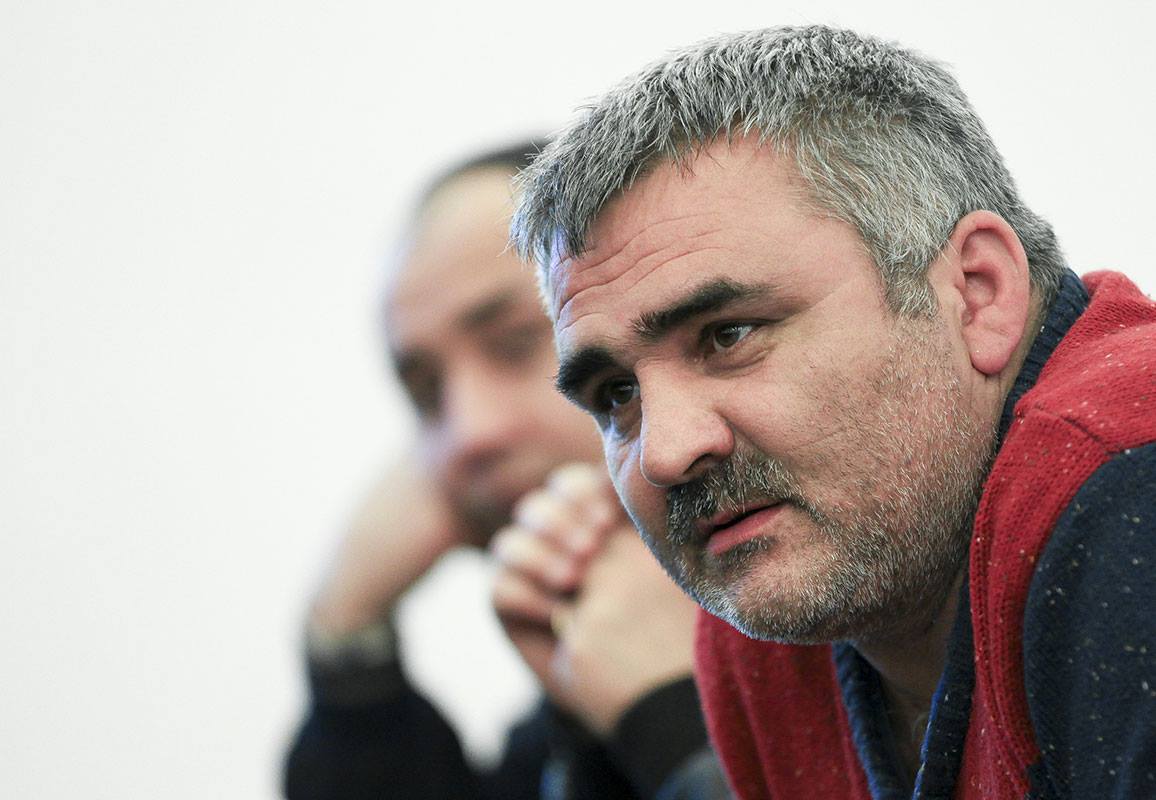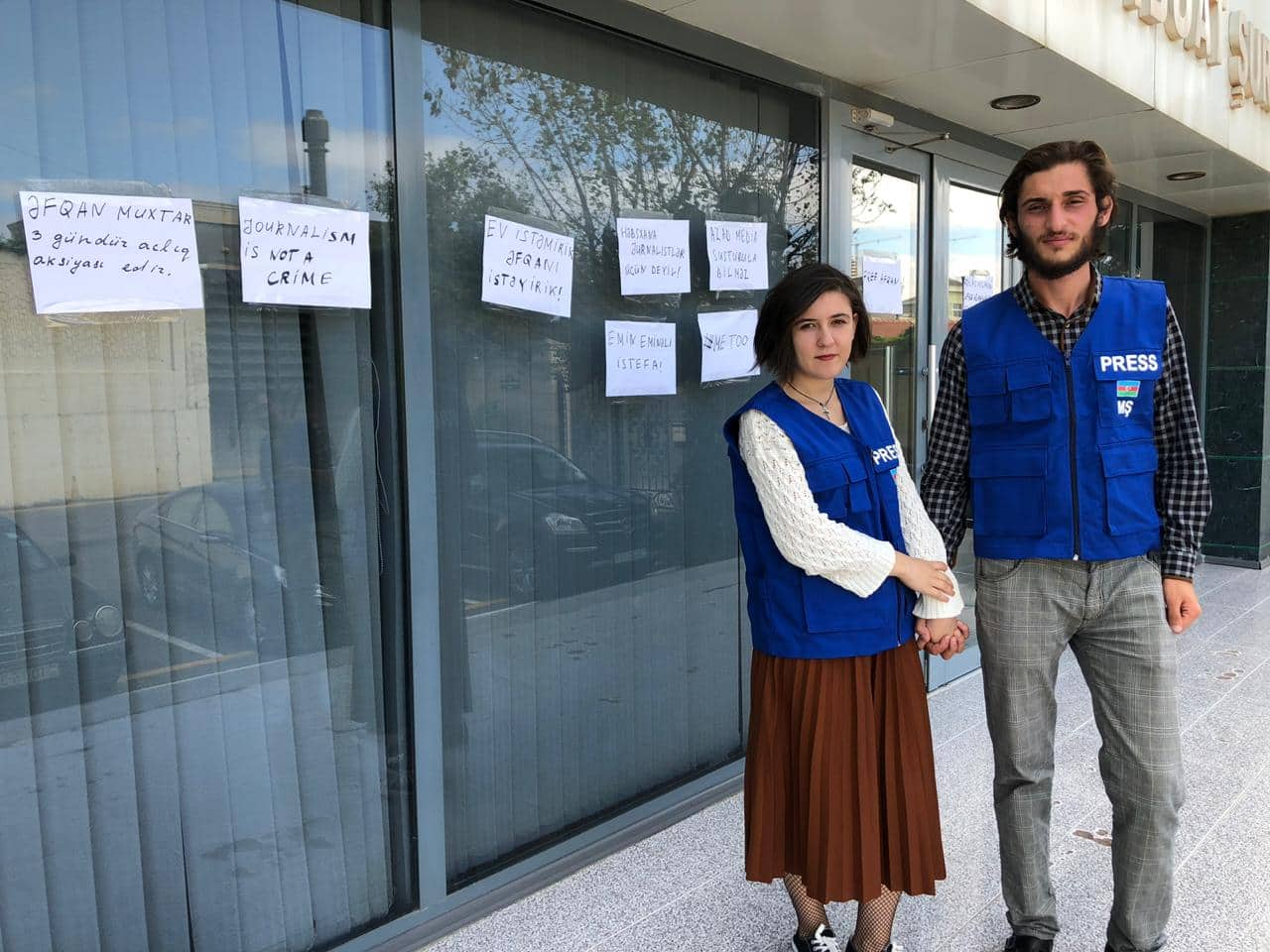

Imprisoned journalist Afgan Mukhtarli has gone on hunger strike in Azerbaijan and stopped taking his medication in protest against his the ‘mistreatment’ of his lawyer at the hands of prison officials.
Mukhtarli, who is serving six years in prison on charges rights groups insist are trumped-up, began his hunger strike on Sunday in protest against the alleged mistreatment of his lawyer, Nemat Karimli, by the deputy chief of the prison.
According to his wife, Mukhtarli has type 2 diabetes and has refused to take his medication, increasing the risk of falling into a diabetic coma.
The news was spread on Facebook by social activist Samad Asadli, who also shared a statement from Mukhtarli.
‘I started my hunger strike to protest the arbitrariness and violence committed towards my lawyer on 20 September. The deputy chief [of the prison] Emin Eminaliyev is characterised by his cruelty towards political prisoners. Before that, he used violence against political prisoner Mammad Ibrahim. He is ruthless and cruel towards prisoners’, the statement read.
‘The complaints against him are not being investigated by the Prosecutor’s Office. I ask [President of Azerbaijan] Ilham Aliyev to objectively investigate what has happened’, he wrote.
‘Emin Eminaliyev and other [prison] officials using violence should be punished. The actions against lawyers are aimed at violating my rights, earlier, Nemet Karimli was suspended from legal services for one year. The present attacks took place after a meeting with European MPs Sunna Thorhildur and D Myatovich’, the statement concluded.
Penitentiary Service spokesperson Mehman Sadigov told Azerbaijani news agency APA on Monday that Mukhtarli had officially informed the prison administration about his hunger strike on Sunday.
‘He started his hunger strike today. Afgan Mukhtarli was isolated from other prisoners. At the moment he doesn’t have any problems with his health. He is under a doctor’s supervision’, he said.
On Monday evening, Leyla Mustafayeva, Mukhtarli’s wife, said on her Facebook that Mukhtarli had been transferred to solitary confinement.
‘Afgan was isolated today from other prisoners, which means he was sent into solitary confinement. If he has started a hunger strike, it means there [is] no legal perspective has left for legal proceeding’, she said.
On Monday, Mustafayeva wrote that Mukhtarli had refused to take his medication and that ‘his health situation is not okay’.
Mustafayeva wrote on Saturday that, Mukhtarli had told her by phone to urge the opposition Popular Front Party, Musavat Party, as well as the Nida youth movement and other civil society activists to hold a protest in front of the prison.
He reportedly cited the case of Mehman Huseynov, an anti-corruption blogger who was sentenced to two years in prison but had additional charges dropped after large protests in Baku.
[Read more on OC Media: Charges dropped against Huseynov after thousands rally in Baku]
Social activist and journalist Nurlan Gakhramanli told OC Media that he went to the building of the Azerbaijani Press Council to protest Mukhtarli’s treatment. He was accompanied by several other journalists who were supporting him.
According to Gakhramanli, they hung posters on the windows of the building saying ‘Journalism is not a crime’, ‘Free Afgan Mukhtarli’, and ‘Free other political prisoners’.

‘Aflatun Amashov [the head of Press Council] walked out and talked to us assuring us we should not worry, because “he will take an interest in the case of Afgan Mukhtarli”. After that, not even 4 hours passed before he [Mukhtarli] was transferred to solitary confinement’, he said.
Allegations of mistreatment
Nemat Karimli, Mukhtarli’s lawyer, wrote on Facebook on Friday that he was mistreated by a prison official earlier that day while he was visiting Mukhtarli.
‘In the morning, I went to visit Afgan Mukhtarli in Penitentiary Number 16. After around 45 minutes they motioned at me and wanted to search me. Though I didn’t agree at first, I agreed later so as not to create tension. They unlawfully searched me [checking] the inside of my shoes and socks.’
Karimli wrote that prison officials also wanted to search him after he had concluded the visit with his client. After he asked for a legal justification for the search, a person calling himself Emin and presenting himself as the deputy chief came in, saying that they ‘search everybody, [because] they have permission’. After a brief discussion, Kerimli agreed to the search.
‘The security officers wanted to read my notes, I didn’t let them. Again Emin intervened and said that the prison chief wanted to see me and that [Emin and I] had to meet him. I refused, he, that is, Emin, forcibly pulled my shirt, shoved me against the wall, and started shouting “who are you? This is a prison, I will show you, you can go and complain to whoever you want, you create a scandal intentionally”. He wanted to bring me to the warden.’
‘I refused, he forcibly took the bag I had in my hands and dumped the contents on the table. He took two pages from another court proceeding and read my personal notes. Afterwards, he reported to the warden and brought the documents to him. I was held hostage for about 45–50 minutes in one of the rooms. Later they returned my documents and sent me away’, Kerimli wrote.
A spokesperson for the Penitentiary Service, Mehman Sadigov, told Turan on Friday that ‘if the lawyer claims that such a case took place, he should make an official appeal to the Penitentiary Service’.
Karimli told OC Media that he filed a complaint to Sabunchu District Prosecutor’s Office in Baku on Monday.
Accusations of collusion between Georgia and Azerbaijan
Mukhtarli appeared in Azerbaijani custody after last being seen in Tbilisi on 29 May 2017, on his way back home after meeting a friend in a café. He resurfaced in an Azerbaijani jail the next day.
According to his lawyers, Mukhtarli was kidnapped by four Georgian-speaking men, three of them wearing police uniforms, who planted money in his pocket as they crossed the Georgian-Azerbaijani border.
Mukhtarli was charged by the Azerbaijani authorities with smuggling €10,000 in cash, illegal border crossing, and resisting police, eventually being sentenced to six years imprisonment.
After being temporarily released from prison to attend a memorial service for his sister and her two daughters in Zagatala, Mukhtarli told Georgian TV station Rustavi 2 he had been investigating business ties between Azerbaijani President Ilham Aliyev and former Georgian prime minister and current head of the ruling Georgian Dream party, Bidzina Ivanishvili.
Mukhtarli also claimed that Georgian authorities — including former Prime Minister Giorgi Kvirikashvili — conspired with Azerbaijan to deliver him across the border. His wife Leyla Mustafayeva claimed his compassionate release was cut short at the request of Georgian authorities after he spoke with Rustavi 2.
Mustafayeva has actively campaigned in Tbilisi for a transparent investigation into the kidnapping. She told OC Media in April she was disappointed with the pace and transparency of the Georgian authorities’ inquiry into the matter, calling it ‘an imitation of investigation’. Mustafayeva, a journalist herself, has sought political asylum in Germany.
[Read more on OC Media: The Afgan Mukhtarli case: an investigation stalled?]








